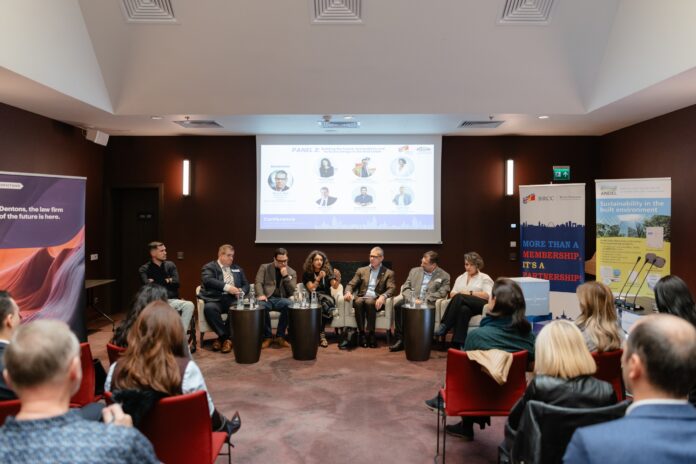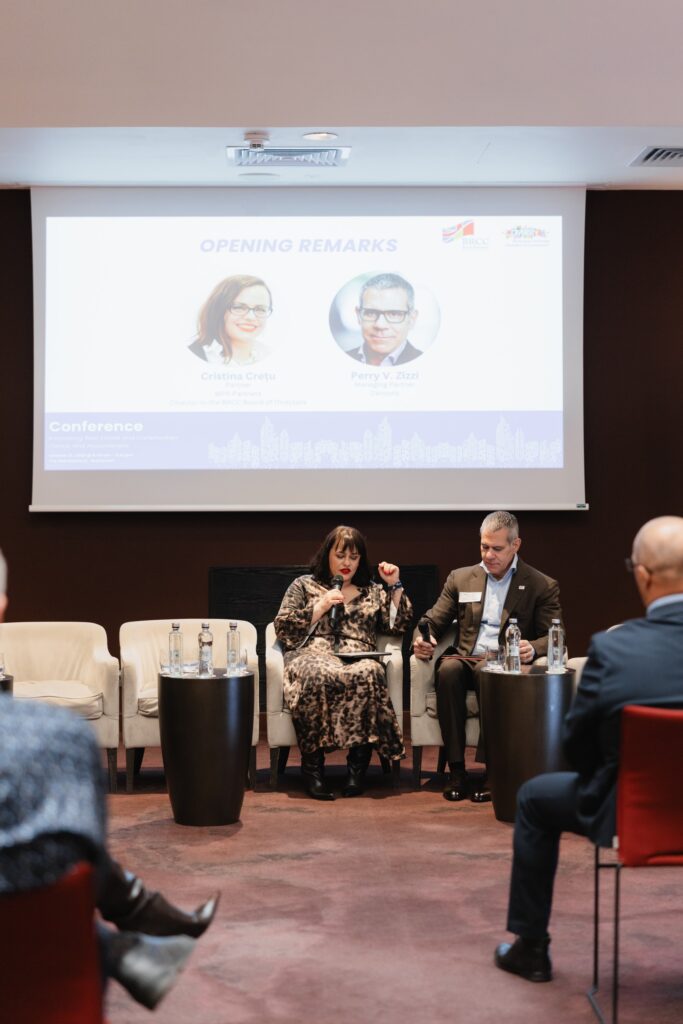Romania’s Real Estate Leaders Unite for a Greener, More Inclusive Future “Innovating Real Estate & Construction: Trends and Inclusiveness 2025” concludes with strong industry alignment on ESG, accessibility, and sustainable finance
With over 170 professionals registered and a strong in person turnout, the second edition of Innovating Real Estate & Construction: Trends and Inclusiveness 2025—co-organized by the Romanian Diversity Chamber of Commerce (RDCC) and the British Romanian Chamber of Commerce (BRCC)—delivered a powerful message: inclusiveness, sustainability, and ESG integration are now core business imperatives, not optional aspirations.
Held under the theme „Building the Future Responsibly,” the event brought together developers, investors, architects, policymakers, and financial institutions to discuss how Romania’s real estate sector is adapting to the European Accessibility Act and the global shift toward green finance and universal design.
Key Highlights
Panel I: Emerging Market Trends in the Real Estate Industry
Moderated by Colin Lovering (Co-Founder and Managing Director, Lovering & Partners), the session featured insights from Colliers, KPMG, CBRE, SIGTREE, and MLP Group Romania. Panelists explored how global and regional dynamics—including market volatility, rising interest rates, and technological advancements—are reshaping Romania’s property landscape.
This panel was opened by a BRCC Board Director – Cristina Crețu, Partner at MPR Partners, who stated that: “At the British-Romanian Chamber of Commerce, we are deeply committed to strengthening the dialogue between business, public administration, and society. Inclusiveness and sustainability are no longer optional extras, but strategic imperatives driving long-term value in real estate and construction. Through collaboration and responsible leadership, BRCC aims to help shape a more sustainable, connected, and resilient built environment for the future.”
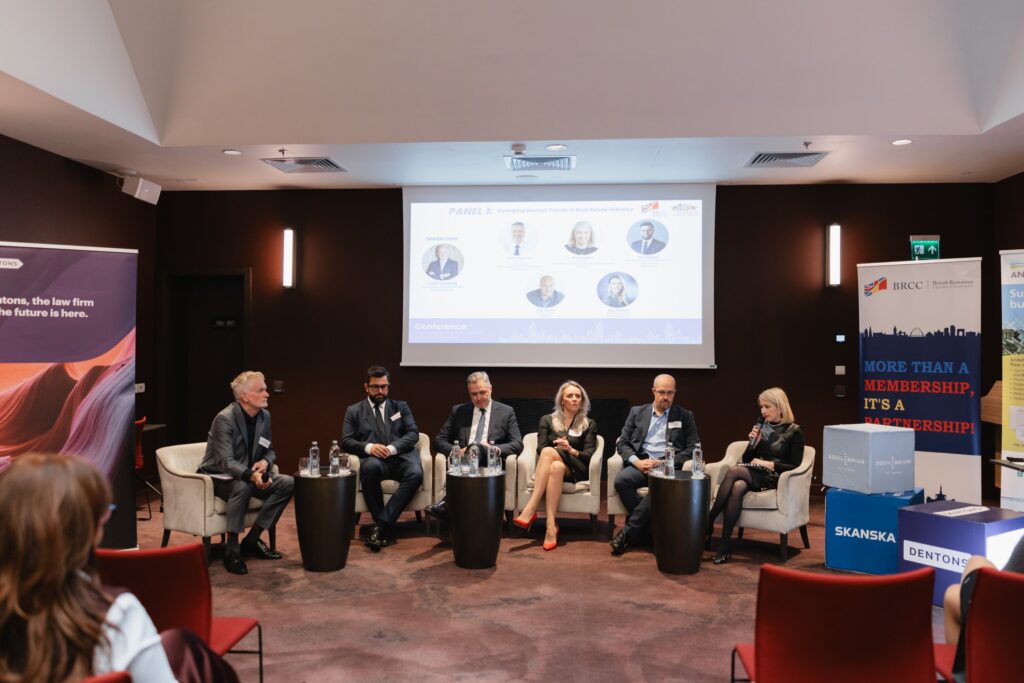
„Today’s event confirmed the reliance that is still a firm foundation for the industry in Romania, but comes with the challenge of adaptability and courage to navigate the game changers in continued political instability, cultural change and, of course AI. I have always said, Romania is like it’s wine. You can’t appreciate how good it is until you’ve tasted it! In conclusion, Romania’s USP’s are clear to everyone but not clear enough for international investors. We need to stop seeing our competitive countries like Poland, as the role model but carve our own identity and attractiveness factor for the industry” stated Colin Lovering, Co-Founder & Managing Director at Lovering & Partners.
„The real opportunity in Romania’s industrial and logistics market lies in capturing change — in supply chains, building use, community integration, and sustainability. Romania’s appeal comes from its cost competitiveness, strategic location, improving infrastructure, young skilled workforce, and growth potential. It is a strategic hub for transformation and long-term value creation” said Olga Melihov, Chief Country Officer at MLP Group Romania.
„Romania has a real opportunity to significantly expand its logistics and industrial space. If the market continues to evolve steadily and the right conditions are in place, we could see warehouse capacity
grow to around 15 million square meters by 2030, up from the 8 million we currently have. Such improvements in connectivity and transport efficiency will play a crucial role in strengthening Romania’s position as a key industrial and logistics hub in the region,” said Victor Cosconel, Partner & Head of Office 360, Industrial & Logistics at Colliers.
„Romania is at an inflection point, and I have a strong conviction that its transport, social and digital infrastructure will significantly develop over the next few years, with direct impact on logistics and some less explored areas such as student accommodation and data centres” stated Mirela Calota, Director, Deal Advisory Real Estate and Transport Infrastructure, KPMG UK
Discussions emphasized Romania’s emergence as a key logistics and industrial hub, supported by strategic infrastructure investments, a skilled workforce, and its unique location bridging Europe and Asia. Experts also highlighted opportunities in data centers and student housing, with innovation and ESG principles steering sustainable growth across the sector.
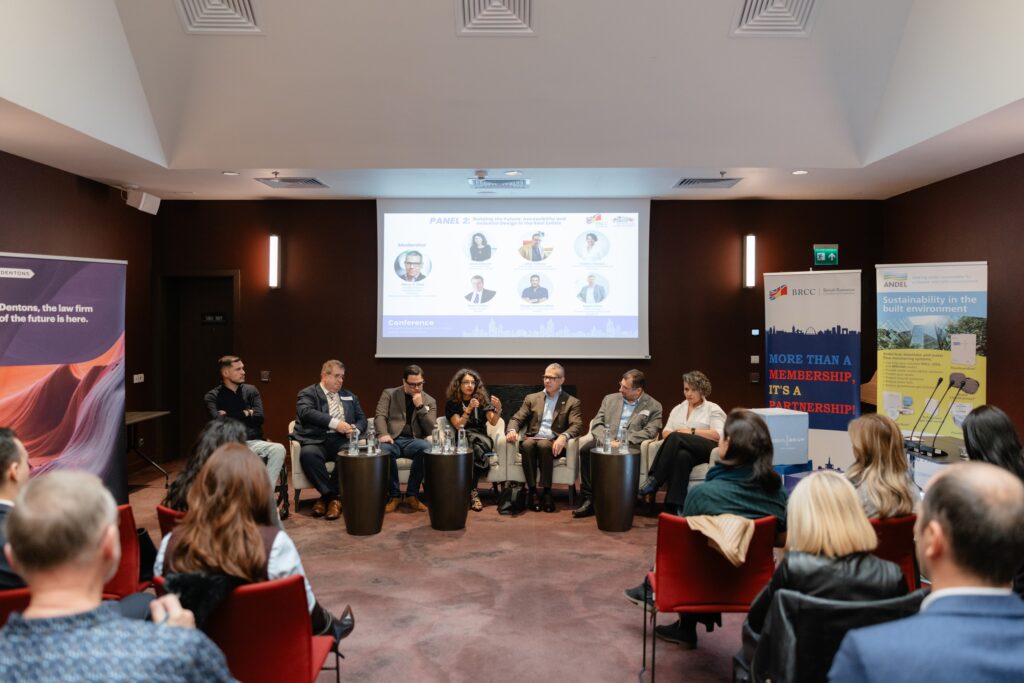
Panel II: Building the Future – Accessibility and Inclusive Design
Dentons Romania Managing Partner and RDCC Board member Perry V. Zizzi , moderated this panel, which explored how accessibility and inclusive design are influencing investment and permitting decisions. He commented, “Accessibility is often charactertized as a costly element of construction. However, viewing it as investment is more accurate, as it helps “future-proof” a building by retaining value, with occupants more likely to attract a larger pool of employees and customers and thereby improving their profitability.”
Speakers from Skanska, AFI Europe, IO Partners, Kaufland, and Mihai Tomescu, Diversity and Inclusion Strategist and former Secretary of State at the National Authority for Persons with Disabilities (ANPD), emphasized the gap between regulation and real-world implementation. The panel called for updated norms, user centered design, and stronger collaboration between developers, civil society, and public authorities.
“Accessibility must start at the design stage—it cannot be an afterthought,” said Bogdan Voicu, Project Manager at Skanska Romania. “When accessibility is embedded in the core design, every subsequent phase naturally follows. At Skanska, this mindset is part of our DNA. We integrate accessibility and neurodiversity from the blueprint stage—not just to meet regulations, but to create buildings where every tenant and employee feels empowered. True inclusivity means setting higher standards—not treating accessibility as an exception, but as a hallmark of great design.”
The panel also advocated for the creation of a national task force—coordinated by RDCC and BRCC—to modernize Romania’s accessibility legislation and align it with European standards.
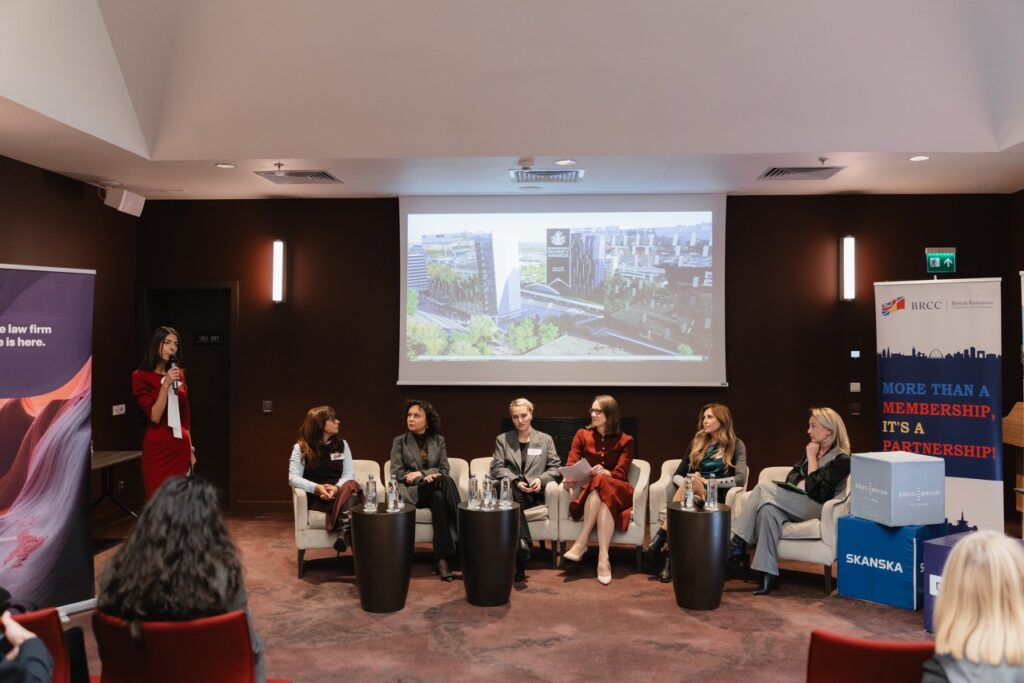
Panel III: Sustainable Finance Instruments for Net-Zero & Social-Impact Real Estate Moderated by Ștefi Ionescu, Counsel at Dentons Romania, the final panel brought together leaders from Raiffeisen Bank, Globalworth, AFI Europe, North Bucharest Investments, and Andel Environmental. Topics included green bonds, sustainability-linked loans, EU Taxonomy alignment, and retrofit economics.
„The Romanian real estate market is experiencing a clear shift toward ESG integration, driven by investor preferences and a growing awareness of sustainability. The event was a valuable opportunity to discuss how responsible investments can truly transform the markets,” said Cătălina Popa, PR & Communication Head at North Bucharest Investments (NBI). “At NBI, we believe sustainability is not just a goal, but a strategic direction that gives meaning and long-term value to every investment”.
„I was honoured to join industry leaders to discuss sustainability, ESG, BREEAM, and LEED systems, and how Andel’s Environmental innovations are helping shape a more responsible & resilient built environment, and that our systems are proven, trusted by global partners and tailored to meet compliance & sustainability targets” added Ioana Martin, Business Development Manager at Andel Environmental. “Our goal at Andel is to make sustainability and risk management simple, practical and something that actually adds value on long term and adaptability for buildings – not just paperwork for certifications.”
Partners and Sponsors
Innovating Real Estate & Construction 2025 was made possible thanks to sponsors Dentons, Skanska, Andel Environmental, Lionhouse Media and North Bucharest Investments. Strategic partners included InnovX, Social Innovation Solutions, and Ambasada Sustenabilității în România / Sustainability Embassy in Romania, with media support from ECONOMISTUL, Club Economic, Radar Imobiliar, Nine O’Clock, Business Review, Ringier Romania and România Durabilă.
Impact and Outlook
With over 170 professionals registered and a strong in-person turnout and record industry engagement, the conference has solidified its reputation as Romania’s leading platform for ESG and accessibility in real estate. Key priorities identified for 2026 include:
● Embedding accessibility into national permitting frameworks aligned with the European Accessibility Act
● Expanding the use of green and social finance instruments in real estate
● Strengthening public-private collaboration to advance Romania’s net-zero and inclusive development agenda


